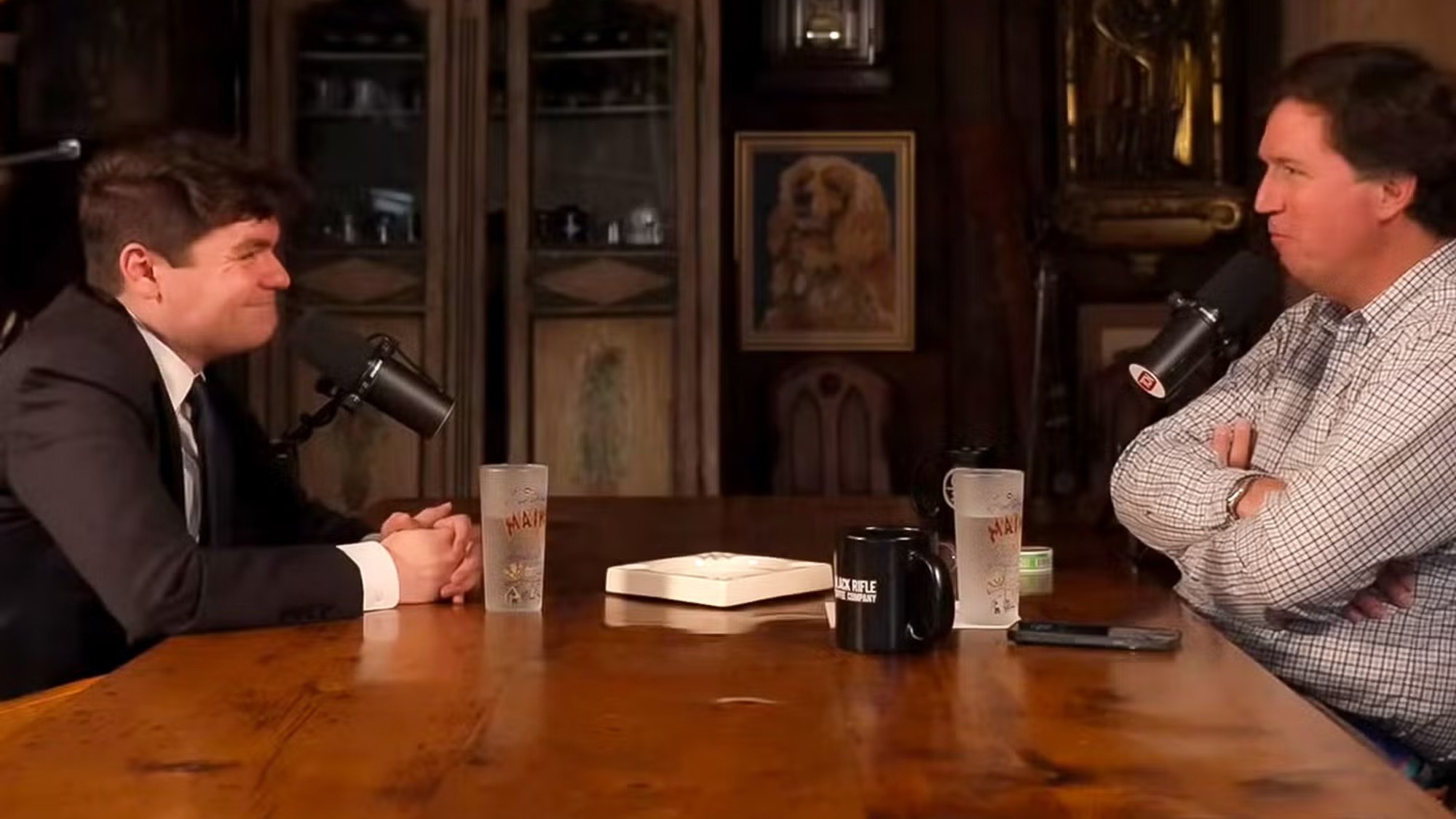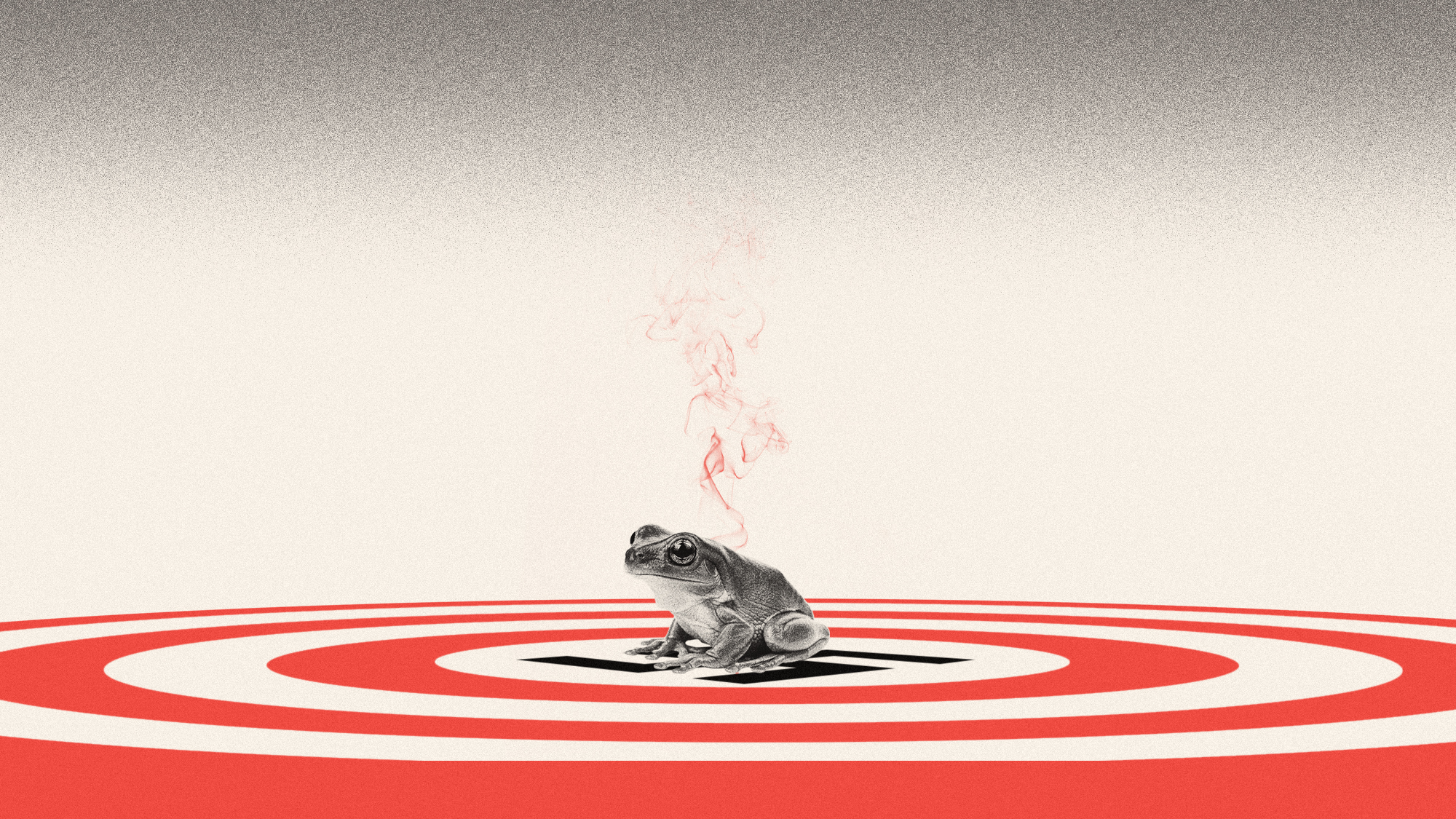Tucker Carlson's specious non-apology
The Fox News host is not a victim of the "outrage machine." He is a conductor.


Tucker Carlson was caught, in his telling, "saying something naughty on a radio show more than a decade ago."
The naughtiness in question was not a single something but a litany of execrable comments about women ("they're extremely primitive; they're basic; they're not that hard to understand"), Hillary Clinton ("so strongly anti-penis"), teenage girls' sexual experimentation ("If it weren't my daughter, I would love that scenario"), the ideal immigrant ("Be hot, be really smart"), Iraq ("a crappy place filled with a bunch of, you know, semiliterate primitive monkeys"), and more.
Carlson responded with a brief refusal to "express the usual ritual contrition" which he expanded into a monologue on his Monday night show, casting himself as the latest victim of "the great American outrage machine." Once the machine takes you as its grist, Carlson said, it's "pointless to try to explain how words were spoken in jest, or taken out of context, or in any case bear no resemblance to what you actually think or would want for the country." Because the reality, Carlson argued, is the machine's product is partisanship, not principle. Its operators' goal is not to defend what is true or good but to ruin his career. The left is a hypocritical horde using morality as a pretense to suppress ideological dissent, and Tucker Carlson, for one, will "never bow to the mob. Ever. No matter what."
The Week
Escape your echo chamber. Get the facts behind the news, plus analysis from multiple perspectives.

Sign up for The Week's Free Newsletters
From our morning news briefing to a weekly Good News Newsletter, get the best of The Week delivered directly to your inbox.
From our morning news briefing to a weekly Good News Newsletter, get the best of The Week delivered directly to your inbox.
For this stand Carlson has been widely praised by his supporters, winning applause for "blast[ing] the left for their blatant hypocrisy," for "giv[ing] 'em hell," for rejecting progressives' "feigned" and "giddy" horror over "a quick guffaw" in an "informal setting."
But such praise is its own pretense, conflating two very separate issues: Whether Carlson's critics are in the wrong is one thing; whether he is also in the wrong is quite another.
Let’s consider the latter first. "You sometimes hear modern progressives described as 'new Puritans,'" Carlson said in his Monday monologue. "That's a slur on colonial Americans. Whatever their flaws, the Puritans cared about the fate of the soul and the moral regeneration of their society." Progressives do not care about those subjects, Carlson said, suggesting in unspoken contrast that he very much does.
In that case, here is an opportunity for Carlson to publicly model the faith and morality he acclaims. Whatever the motives of the "outrage machine" — and I'll come back to that in a moment — the moral quality of this "something naughty" remains the same. The need for repentance, for repudiation of these words and a turn to a better course for "the fate of the soul," remains the same. That the comments were made about a decade ago makes no difference; the passage of time does not grant absolution. And the public nature of the original remarks means a public contrition is probably appropriate.
A free daily email with the biggest news stories of the day – and the best features from TheWeek.com
Carlson's monologue suggests he was somehow misrepresented, that a joke has been taken too seriously, or that he is being tarred for old views he no longer holds. The first two are impossible to credit: This is not a case of unproven allegations, a contextless quote, or grotesquerie that lives in the eye of the beholder. Whatever we think of the ethics of digging up old tapes like this, the fact is we have the tapes. The full context is clear. We know what was said and who said it.
These are words Tucker Carlson between the ages of 36 and 41 thought it was fitting to say to the world. And it is not very difficult, as an adult of reasonably good character, to avoid saying things like this in public. It is not very difficult to decline to go on radio shows where things like this are encouraged. No, there isn't any misrepresentation here; "out of the abundance of the heart his mouth speaks." If this is no longer what is in his heart, let him say so. (Carlson describes himself as a conservative Episcopalian who "love[s] the liturgy." His church's Book of Common Prayer is bursting with resources to guide repentance.)
Now, about that outrage machine and Carlson's critics, audience, and employer. Should he lose his job over this? I don't know. I can see the reason in arguments for and against it. Realistically, whether Carlson stays or goes, his commentary hour will be filled with the same sort of content, and Carlson will continue to be a popular pundit on Fox or off. The crowd cheering him now will stay his crowd even if he's ousted. Fox knows this, and, as there is no suggestion of prosecutable behavior, will probably keep Carlson around.
The more practically important topic, then, is the critics: Is this all just dirty politics, with unethical muckrakers digging through Carlson's archives out of partisan spite? No, not entirely. There are plenty who do sincerely care about the principles here.
But there is a reason Carlson's "outrage machine" plaint resonates so widely. We are, as a culture, addicted to conflict, ever eager to escalate and see our political enemies suffer. We are fixated on public shame, shuffling those we condemn into a permanent "bad person" category from which it is very difficult to exit, even after real change. We are prone to disproportionate reactions, including where outrage is concerned. And Twitter is indeed poisonous.
"In America's digital culture, outrage is packaged to almost every niche in the citizenry. People feel a 'duty' to be outraged by the offenses being trotted out," writes Conor Friedersdorf at The Atlantic. "And when so much is treated as outrageous, a culture loses the ability to focus on the ills that matter or even to easily describe why they are truly outrageous."
Where Carlson and his backers go wrong in their complaint about outrage culture is twofold: their insistence that it is only a creature of the left, and their sleight of hand to avoid dealing with the principle of the thing once they have denounced the other side's partisanship. Carlson himself traffics in outrage as much as any commentator on cable news, and the left-wing Media Matters, the organization that unearthed the radio clips, is mirrored on the right by the Media Research Center. Opposition research is not unique to one side or the other; just last month we were debating the political future of Virginia Gov. Ralph Northam (D) on the basis of a report from a conservative site called Big League Politics.
Recognizing this complicity on his own side, of course, would require a very different response from Carlson than the one he has chosen. If he really wanted to de-escalate, he would not fight outrage with outrage. And that, unlike his radio remarks, might actually get him booted from Fox.
Bonnie Kristian was a deputy editor and acting editor-in-chief of TheWeek.com. She is a columnist at Christianity Today and author of Untrustworthy: The Knowledge Crisis Breaking Our Brains, Polluting Our Politics, and Corrupting Christian Community (forthcoming 2022) and A Flexible Faith: Rethinking What It Means to Follow Jesus Today (2018). Her writing has also appeared at Time Magazine, CNN, USA Today, Newsweek, the Los Angeles Times, and The American Conservative, among other outlets.
-
 Which way will Trump go on Iran?
Which way will Trump go on Iran?Today’s Big Question Diplomatic talks set to be held in Turkey on Friday, but failure to reach an agreement could have ‘terrible’ global ramifications
-
 High Court action over Cape Verde tourist deaths
High Court action over Cape Verde tourist deathsThe Explainer Holidaymakers sue TUI after gastric illness outbreaks linked to six British deaths
-
 The battle over the Irish language in Northern Ireland
The battle over the Irish language in Northern IrelandUnder the Radar Popularity is soaring across Northern Ireland, but dual-language sign policies agitate division as unionists accuse nationalists of cultural erosion
-
 The billionaires’ wealth tax: a catastrophe for California?
The billionaires’ wealth tax: a catastrophe for California?Talking Point Peter Thiel and Larry Page preparing to change state residency
-
 Bari Weiss’ ‘60 Minutes’ scandal is about more than one report
Bari Weiss’ ‘60 Minutes’ scandal is about more than one reportIN THE SPOTLIGHT By blocking an approved segment on a controversial prison holding US deportees in El Salvador, the editor-in-chief of CBS News has become the main story
-
 American antisemitism
American antisemitismFeature The world’s oldest hatred is on the rise in U.S. Why?
-
 The GOP: Will it welcome antisemites?
The GOP: Will it welcome antisemites?Feature That Carlson would grant Fuentes access to his massive audience is proof that his hate ‘is entering the MAGA mainstream’
-
 Has Zohran Mamdani shown the Democrats how to win again?
Has Zohran Mamdani shown the Democrats how to win again?Today’s Big Question New York City mayoral election touted as victory for left-wing populists but moderate centrist wins elsewhere present more complex path for Democratic Party
-
 Nick Fuentes’ Groyper antisemitism is splitting the right
Nick Fuentes’ Groyper antisemitism is splitting the rightTalking Points Interview with Tucker Carlson draws conservative backlash
-
 Millions turn out for anti-Trump ‘No Kings’ rallies
Millions turn out for anti-Trump ‘No Kings’ ralliesSpeed Read An estimated 7 million people participated, 2 million more than at the first ‘No Kings’ protest in June
-
 Ghislaine Maxwell: angling for a Trump pardon
Ghislaine Maxwell: angling for a Trump pardonTalking Point Convicted sex trafficker's testimony could shed new light on president's links to Jeffrey Epstein
